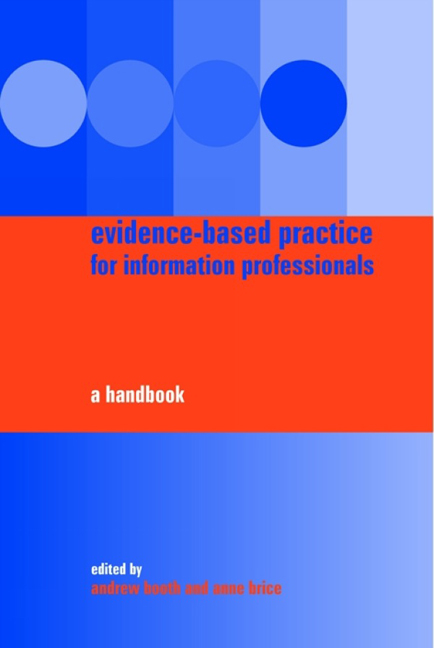Book contents
- Frontmatter
- Contents
- Foreword
- Editors and contributors
- Part 1 The context for evidence-based information practice
- 1 Why evidence-based information practice?
- 2 A brief history of evidence-based practice
- 3 Evidence-based information practice: a prehistory
- 4 How good is the evidence base?
- 5 Why don't librarians use research?
- Part 2 Skills and resources for evidence-based information practice
- Part 3 Using the evidence base in practice
- Index
5 - Why don't librarians use research?
from Part 1 - The context for evidence-based information practice
Published online by Cambridge University Press: 08 June 2018
- Frontmatter
- Contents
- Foreword
- Editors and contributors
- Part 1 The context for evidence-based information practice
- 1 Why evidence-based information practice?
- 2 A brief history of evidence-based practice
- 3 Evidence-based information practice: a prehistory
- 4 How good is the evidence base?
- 5 Why don't librarians use research?
- Part 2 Skills and resources for evidence-based information practice
- Part 3 Using the evidence base in practice
- Index
Summary
Introduction
It is frequently asserted that librarians do not use research findings when making decisions related to their professional practice. It is claimed that their decisions are based on little more than instinct or colleagues’ opinions, and that as a result their decision making may be ill-informed and high-risk. It is further claimed that this situation indicates a ‘communication gap’ between researchers and practitioners, and that this gap inhibits the maturation of librarianship, as many practitioners operate without an adequate understanding of the theoretical foundations to their practice.
This chapter examines the evidence related to the use of research by practitioners and the nature of the communication gap. In doing so it provides an overview of reasons advanced to explain why librarians do not use research data. It also explores the characteristics of the literature of librarianship, and the part played by education in preparing practitioners for the use of research-based evidence. Finally, it presents suggestions for improving the use of research by practitioners.
Scenario
The research
Considerable research has been conducted that compares and reviews information retrieval systems’ features. Much of this research is conducted and published by researchers associated with the field of information science. Their aim is to identify systems’ features that make information searching as easy and relevant to the searcher as possible. The findings of this research tend to be published in scholarly journals and is presented at research-oriented conferences.
The practice
The automated system of a medium size government library needs upgrading to incorporate new and improved features, such as Internet links and better searching capabilities. The librarian gains approval from the department to purchase a new system within a specified budget. Advertisements for automated systems in recent issues of the professional association's newsletter provide the contact details for local agents. However, before contacting the agents the librarian calls colleagues at other government libraries to ask for their opinions about systems to which they have upgraded in the last few years and posts a message to a discussion list requesting information about the relative merits of systems being used in other libraries.
- Type
- Chapter
- Information
- Evidence-based Practice for Information ProfessionalsA Handbook, pp. 49 - 60Publisher: FacetPrint publication year: 2004
- 3
- Cited by



